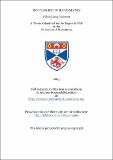Files in this item
Entitlement in mathematics
Item metadata
| dc.contributor.author | Pedersen, Nikolaj J. | |
| dc.coverage.spatial | 229 p. | en_US |
| dc.date.accessioned | 2018-07-05T11:40:40Z | |
| dc.date.available | 2018-07-05T11:40:40Z | |
| dc.date.issued | 2005 | |
| dc.identifier.uri | https://hdl.handle.net/10023/14980 | |
| dc.description.abstract | This first half of this thesis investigates the epistemological foundations of mathematical theories, with special attention devoted to two questions: (1) how can we have a warrant for the satisfiability and consistency of mathematical theories, and (2) given we conceive of mathematical judgement as objective - as being concerned with a realm of abstract entities - can we have a warrant for thinking that such a realm of entities exists? In Chapter 2, two kinds of mathematical scepticism are developed. The regress sceptic argues that we can have a warrant for accepting neither the satisfiability nor the consistency of a mathematical theory. The I-II-III sceptic maintains that there can be no warrant for thinking that a realm of abstract entities exists if mathematical judgement is conceived as being objective. The notions of entitlement of cognitive project and entitlement of substance - recently introduced into the literature by Crispin Wright - are invoked to respond to the mathematical regress and I-II-III sceptic. This is done in Chapters 3 and 4. The distinctive feature of an entitlement is its non-evidential nature. What is relevant is not the presence of positive evidence, but rather the absence of sufficient countervailing evidence. The second half of the thesis explores and develops certain aspects of this proposal. Chapter 5 develops the notion of entitlement of cognitive project by investigating two of its three defining clauses. Chapter 6 draws a picture of a wider philosophical framework of which entitlement can be regarded an integrated part. In so doing entitlement is discussed in light of the internalism/externalism distinction and the distinction between monism and pluralism about epistemic value. Chapter 7 tables two fundamental challenges to the entitlement proposal - firstly, whether entitlement is an epistemic notion of warrant at all, and secondly, whether the notion of rationality associated with it is epistemic in nature or of some other kind? | en_US |
| dc.language.iso | en | en_US |
| dc.publisher | University of St Andrews | |
| dc.subject.lcc | QA8.4P4 | |
| dc.subject.lcsh | Mathematics--Philosophy | en |
| dc.subject.lcsh | Knowledge, Theory of | en |
| dc.subject.lcsh | Skepticism | en |
| dc.title | Entitlement in mathematics | en_US |
| dc.type | Thesis | en_US |
| dc.contributor.sponsor | Danish Research Agency | en_US |
| dc.contributor.sponsor | Arts and Humanities Research Council (AHRC) | en_US |
| dc.type.qualificationlevel | Doctoral | en_US |
| dc.type.qualificationname | PhD Doctor of Philosophy | en_US |
| dc.publisher.institution | The University of St Andrews | en_US |
This item appears in the following Collection(s)
Items in the St Andrews Research Repository are protected by copyright, with all rights reserved, unless otherwise indicated.

